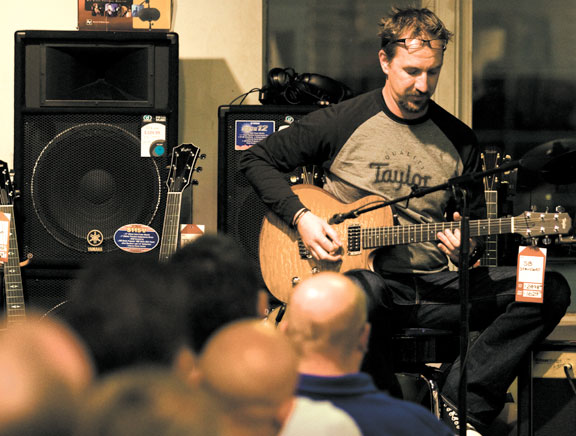I heard a joke about guitar players yesterday that went something like… “Q: How does a guitar player make a million dollars? • A: start with two million dollars.” Hahaha. Only wives and girlfriends are laughing right now. But they’re just jealous because we guitar players would love nothing more than to be able to be able to play guitar as work, as exercise, as release from anxiety, as vacation, as a substitute for food, etc..
Many guitar players dream of one day making a living as a guitar player. I’d like to share some of what I’ve learned as a guitar player to help you along.
1. Contrary to what Brad Paisley & Keith Urban sing, DON’T start a band
As a band member, your loyalty is to the band as a whole. That means you invest time, talent, creativity, and effort into making it work. The dirty little secret is that most bands don’t become profitable. Sure, you could get a record deal, but do some research online and you’ll find that you have a better chance of getting struck by lightning while winning the lottery than you do of making millions of dollars as a guitar player. Mathematically speaking, if the band plays a club and makes $200, your 5-member band each gets $40. Boo. Consider the hours of rehearsal, tone sculpting, booking, advertising, social networking, selling merch, and performing and that $40 adds up to an awful hourly rate.
2. Become a sideman
A sideman is a pro guitar player who advertises himself or herself as a “hired gun”. In this case, you are hired by an MD (Musical Director) for a singer/songwriter, show, tour, church service, etc. and the budget is the MD’s responsibility, not yours. Gigs and services often pay at least $100 with rehearsals in the $50-$75 range. In this case, your professionalism will make or break you. Showing up prepared, on time, and in good spirits (without the help of chemical substances) will send a message that you take this career seriously. It helps to remember that, at the level when an MD is involved, money is changing hands and people have more at stake. If you play well and are professional, you make yourself look better and you make the MD look better. Everybody wins and your credibility and equity increase.
3. Become a salesman
Face it. There will come a day when you are no longer fit for the stage. That day may be 20 years from now and it may have been 20 years ago. Either way, you’re still a guitar player and want to be around them. You might try going into sales. At the retail level, you may find an independent store that is willing to hire you on a base salary plus commission on sales. It means you’ll always make a little money but if you’re successful at selling, then you stand to make a good deal more. I have known a few guys who started as a sales guy and eventually bought the store from the original owner. There’s a great tradition in selling musical instruments and it’s in some ways a higher calling than playing the instruments. If you’re a player, then it will be easier to demo the gear for potential customers and you’ll have more credibility than the guy who just wants to make money. If you don’t like the retail level, you could submit resumes to manufacturers like Gibson, Fender, Martin, Taylor, etc. and ask to join their sales team. It’s still sales, but now you’re selling to the stores who sell to the customers.
4. Become a Product Specialist
With the rising popularity of YouTube, you’re seeing more and more players doing demos of their own gear. Finding a way to monetize that is the key. Contact manufacturers whose gear you already know and love and submit a proposal that trades in-depth gear demonstrations for payment or for wholesale pricing on gear. Keep in mind, there are a lot of guys doing this these days and manufacturers are becoming overwhelmed with offers to trade YouTube videos for gear. A hard truth is that many of the boutique manufacturers don’t have the money to give away gear because their profit margins are too tight and many of the larger manufacturers have in-house demo players/ product specialists on salary.
5. Teach
Many local music stores hire guitar teachers to teach beginning students. Lessons are a great revenue source for stores and being willing to offer additional teachers to students makes them look better and more reputable. Keep in mind, the store will probably pay an hourly wage to you regardless of how much they bring in for the half hour lesson.
6. Become a provider of mail-away guitar tracks
It’s exciting to think that you could make money without leaving your house. These days, home studios are more popular than ever and records are being made in remote locations with file delivery being handled via FTP upload. In this case, you would need an AVID ProTools or Apple Logic recording rig, which would include a fast computer, the software, microphone(s), mic pres, and possibly some sound isolation materials. You could very easily be looking at $2k in investment in hopes that clients will start calling. It’s also important to note that session work is harder because the client has the luxury of playback to make sure your feel, tones, and recording habits are good enough for the budget. It’s a challenge, to say the least, because there’s empirical proof of your downfalls (which EVERY guitarist has).
With all of these options, it’s important to keep them in perspective: they are JOBS. Anyone who hires you is your employer and therefore has the right to negotiate what and how you play, what you wear, what the hours are, how much you’ll get paid. If you want to play guitar for a living, you’ll have to learn how to negotiate in such a way that you stand your ground but are non-offensive and non-adversarial. Music is a business of good guys and “hey bro” handshakes. If you’re a difficult personality, you may find that you’re getting hired less and less frequently.
Which leads me to the last point. I’ve been involved with all of these gigs (except retail guitar sales) and more. The one thing that ties them all together is that I was in the right place at the right time. NOBODY has thrown a dart at the phonebook, only to land on my name so they can call and ask if I’m a smokin’ guitar player. NOBODY. What gets gigs is to have gigs. And what it takes to have gigs is to go watch gigs, hang out with players, offer to stay late or show early so you can help other players load their gear in and out. Ask about pedalboards. Start conversations. Pay compliments when they’re appropriate. Do NOT look desperate, but spend time learning how to talk to people. Look them in the eye, be confident, and add some swagger to your demeanor.
Good luck, and stay away from my gigs. 😉




Comments on this entry are closed.
Great post. Can I add one more?
If you’re handy with a soldering iron and you like to tweak out on gear, there are people willing to pay you money to fix their gear, or to setup their rigs. If you can do it right, do it quickly, and get the players back to playing, there is very good money to be made by running a repair shop.
My experience is over on the keyboard side, where a good repair tech, especially one who understands vintage gear, is a jealously guarded trade secret. There are only a handful who do really solid work, and they stay backlogged with clients.
Great point, Mike. Nashville Session Ace, Tom Bukovac uses a guy all the way in Chandler, AZ to work on his BOSS Space Echo units and I normally send everyone east of the Mississippi River to one of two guys on the east coast for repairs. A great repairman who respects the sanctity of vintage gear is rare and could potentially carve out a very nice living for himself.
This is a great post and a timely one for me!!! I am a sel-employed “burned out” CPA by profession and was telling my wife for the millionth time the other day that I “had” to find something else to do. Guitar/music has always been my passion and I have been trying to think of ways to gradually and profitibly integrate that into my schedule. Since the majority of my CPA work is in the first 3 months of the year I have the luxury of hanging on to that while I try to work out something else. I taught guitar while I was in college so I knew about that option. Playing consistently at a rather large church for the past 10 years has given me a good opportunity to jump into different mixes of musicians and songs without much practice, so that would help with the sideman option. However these were some other good things to think about. I already knew a band was a waste of time as I have seen the tax return/income side of what looks on the surface as success (CD’s, tours, even music videos but no MONEY!!) I know I can probably never totaly replace my CPA income with guitar work but just some variety for the non tax season months of the year would be huge. Trying to force a musicians heart into a CPA body everyday for 25 years has left me pretty bummed out. You have given me HOPE!!!!
I hear you, Paul. It’s a tough game to play once we start playing guitar for money since it’s normally the thing we use as an escape. There’s the old “don’t-poo-where-you-eat” principle at work. However, I have been living for years on the phrase, “do what you love and you’ll never work a day in your life”, and it keeps me pushing forward even when the hustle gets tedious. Good luck!
Best advice if seen yet. Me – 30 years guitarist. Play in a band to have fun – not make money 9 out of 10 times the band WILL breakup – too many headcases out there and if you are lucky to have a good band – band members have families – they come first and goodbye to band.
being a musician in a country like u.s.a (where all the people are musician for themselves) , is like selling the thing which is always found like : air !
I’ve been working with 3 bands in 3 corner of this country for 14 years and all I can say is : “please have another career other than music if you wanna pay your bills!”